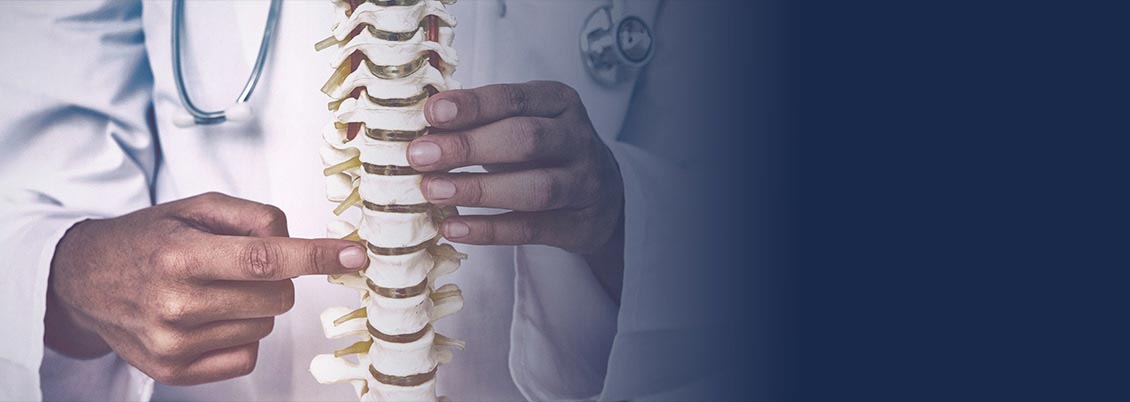Herniated Discs Treatment Clinic in Jersey City, NJ
Herniated discs can lead to back pain, numbness, tingling, and muscle weakness, often caused by disc degeneration or injury. Effective treatment focuses on reducing pain, improving mobility, and preventing further complications. Options may include physical therapy, spinal adjustments, pain management techniques, and personalized rehabilitation plans tailored to your needs. Early care can promote faster recovery and long-term spinal health. Come meet our team at Harborside Sport & Spin, we are committed to helping you heal better and regain your quality of life. For more information, contact us or schedule an appointment online. We are conveniently located at 75 Montgomery Street, Suite 603, Jersey City, NJ 07302.




Table of Contents:
What is a herniated disc?
What causes a herniated disc?
Is surgery necessary for a herniated disc?
What are the risks of untreated herniated discs?
How can Dr. David Sylvester DC at Harborside Sport & Spine treat your herniated disc?
A herniated disc, sometimes called a slipped or ruptured disc, occurs when the gel-like center of an intervertebral disc pushes through its tougher outer layer, potentially pressing on nearby nerves. This can lead to pain, numbness, or weakness, often affecting the lower back or neck.
Comprehensive Evaluation: A thorough assessment often begins with a physical examination to evaluate flexibility, muscle strength, reflexes, and nerve function. Advanced imaging techniques, such as MRI or CT scans, may be used to determine the extent and location of the disc issue for a precise diagnosis.
Personalized Treatment Plans:
Non-surgical treatment options are commonly recommended and may include:
● Chiropractic Care: Spinal adjustments aimed at relieving nerve pressure and improving alignment.
● Physical Therapy: Targeted exercises and therapies designed to enhance flexibility, strengthen supporting muscles, and promote spinal stability.
● Pain Management: The use of medications and other techniques to manage discomfort and inflammation, facilitating better mobility and recovery.
Holistic and Preventive Care: Preventive strategies can help reduce the risk of further disc issues. These may include lifestyle modifications such as proper lifting techniques, weight management, smoking cessation, and ergonomic adjustments to support long-term spinal health.
Advanced Interventions: When conservative treatments are not effective, more advanced options may be explored. This could include minimally invasive procedures or surgical interventions, ensuring comprehensive care based on the individual’s needs.
A herniated disc, also referred to as a slipped or ruptured disc, occurs when the soft, gel-like center of an intervertebral disc pushes through a tear in its tougher outer layer. These discs act as cushions between the vertebrae, helping absorb shock and aid spinal flexibility. Understanding the common causes of herniated discs can help individuals make informed choices about spinal health and injury prevention.
Common Causes of Herniated Discs
● Age-Related Degeneration: As the body ages, spinal discs lose water content and elasticity, making them more vulnerable to tears and ruptures. This natural degeneration often occurs with minimal strain due to the reduced flexibility of the discs.
● Improper Lifting Techniques: Lifting heavy objects with the back instead of the legs can place excessive stress on the spine, increasing the risk of disc herniation. Practicing proper lifting mechanics, such as bending the knees and keeping the back straight, can help reduce this risk.
● Sudden Movements and Trauma: Unexpected motions or traumatic events, such as falls, collisions, or heavy impacts, can cause a disc to herniate. Engaging in safe movement practices and avoiding abrupt, forceful motions can help protect the spine.
● Occupational and Lifestyle Factors: Jobs involving repetitive bending, lifting, or prolonged sitting can strain the spine over time. Maintaining proper posture, using ergonomic workstations, and taking breaks to move throughout the day can reduce spinal stress.
● Excess Weight and Physical Inactivity: Carrying excess weight places additional pressure on spinal discs, while a sedentary lifestyle weakens the muscles that support the spine. Maintaining a healthy weight through proper nutrition and regular physical activity can help protect spinal health.
● Genetic Factors: Some individuals may be genetically predisposed to disc issues due to structural weaknesses in the spine or inherited conditions affecting disc health.
By recognizing these contributing factors, individuals can take proactive steps to protect their spine through healthy lifestyle habits and proper body mechanics.
Surgery is not always required for a herniated disc, as many cases can be effectively managed with non-surgical treatments. A herniated disc occurs when the soft, inner portion of a spinal disc pushes through a tear in its outer layer, potentially causing pain, numbness, or weakness due to nerve compression. It commonly affects the lower back (lumbar spine) and neck (cervical spine).
Non-Surgical Treatment Options: Most herniated discs can be managed with conservative approaches, which aim to relieve pain, improve mobility, and promote healing. Common non-surgical treatments include:
● Physical Therapy: Targeted exercises can strengthen the muscles supporting the spine, improve flexibility, and reduce pain.
● Chiropractic Care: Gentle spinal adjustments may help relieve nerve pressure and improve spinal alignment.
● Massage Therapy: Therapeutic massage can reduce muscle tension, improve circulation, and aid in pain relief.
● Lifestyle Modifications: Practicing good posture, maintaining a healthy weight, and avoiding activities that strain the spine can help prevent further issues.
When Surgery May Be Considered: Surgery is typically only recommended when conservative treatments fail to provide relief or if the herniated disc causes severe symptoms, such as significant nerve compression leading to muscle weakness, loss of bladder control, or persistent pain.
Common Surgical Options:
● Microdiscectomy: A minimally invasive procedure where the herniated portion of the disc is removed to relieve nerve pressure.
● Laminectomy: A more extensive surgery involving the removal of a portion of the vertebra (lamina) to create space and reduce nerve compression.
The decision for surgery is typically made after a thorough evaluation and discussion, ensuring all treatment options have been considered based on the severity of the condition and the patient’s health goals.
Our multidisciplinary team focuses on alleviating chronic pain through personalized treatment plans. We offer a range of therapies, including chiropractic care, physical therapy, and pain management techniques, to address the root cause of your pain and enhance your mobility and quality of life.
● Preventing Progressive Nerve Damage: Early intervention is crucial in minimizing the risk of nerve damage related to spinal issues. Diagnostic tools such as physical assessments and imaging are commonly used to evaluate nerve involvement. Treatment strategies may include spinal decompression techniques, therapeutic exercises, and pain management approaches to relieve nerve pressure and reduce discomfort.
● Emergency Care for Severe Nerve Compression: Conditions like cauda equina syndrome require urgent medical attention to prevent long-term complications. Prompt recognition of warning signs, such as loss of bladder control or severe leg weakness, can ensure timely medical intervention, including potential surgical referral when necessary.
● Relief for Nerve-Related Pain: Nerve compression, such as in sciatica, can often be managed through non-invasive therapies aimed at reducing inflammation and nerve irritation. Approaches may include physical therapy, gentle stretching, and other therapeutic techniques to alleviate pain and improve mobility.
● Preventing Muscle Weakness and Atrophy: Prolonged nerve compression can lead to muscle weakness or atrophy over time. Rehabilitation strategies often focus on strengthening affected muscle groups through customized exercise routines, physiotherapy, and functional movement training to promote muscle recovery and prevent further deterioration.
● Supporting Spinal Alignment and Stability: Maintaining proper spinal alignment is essential for preventing deformities like scoliosis or kyphosis. Supportive care may include posture correction, core stabilization exercises, and manual therapies designed to improve spinal balance and reduce strain on surrounding structures.
At Harborside Sport & Spine, we believe in the importance of early evaluation and intervention for herniated discs. Our comprehensive approach is designed to prevent complications and enhance your quality of life. If you’re experiencing symptoms of a herniated disc, such as back pain, radiating pain, numbness, or weakness, don’t wait—reach out to us for expert care and support. Your health and well-being are our top priorities.
Herniated discs can lead to intense back or neck pain, numbness, tingling, and even weakness in the limbs. At Harborside Sport & Spine in Jersey City, Dr. David Sylvester DC, specializes in non-surgical, drug-free treatment for herniated discs. He uses a combination of spinal decompression therapy, targeted chiropractic adjustments, and rehabilitative exercises to relieve pressure on the affected disc and restore normal function.
Each treatment plan at Harborside Sport & Spine is customized to your specific condition, symptoms, and recovery goals. Dr. Sylvester also emphasizes improving spinal alignment, posture, and core stability to prevent future flare-ups. Many patients experience significant relief and increased mobility within a few weeks—without the risks associated with surgery or long-term medication use. For more information, contact us or schedule an appointment online. We are conveniently located at 75 Montgomery Street, Suite 603 Jersey City, NJ 07302. We serve patients from Jersey City NJ, Hoboken NJ, Weehawken NJ, West New York NJ, Guttenberg NJ, Secaucus NJ, Harrison NJ, Kearny NJ, Newark NJ, Belleville NJ, Lyndhurst NJ, East Orange NJ, and Elizabeth NJ.
Check Out Our 5 Star Reviews


Chiropractic and Physical Therapy Services
▸ Chiropractic
▸ Physical Therapy
▸ Massage Therapy
▸ Acupuncture
▸ Spinal Decompression
▸ Prenatal Chiropractor
▸ Ear Infections
▸ Foot Pain
▸ Headaches
▸ Scoliosis
▸ Slipped Disc
▸ Sprained Ankles
▸ Stress
▸ Frozen Shoulder
▸ Osteoporosis
▸ Shoulder Pain







